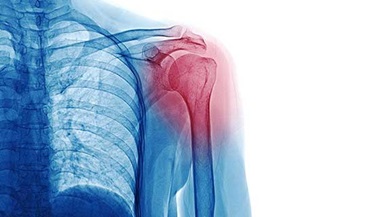Shoulder Dislocation
What You Need to Know
- Dislocation of your shoulder means your upper arm bone (humerus) has come out of your shoulder joint.
- Your shoulder can dislocate in several ways: forward and downward dislocation, and backward dislocation.
- A dislocated shoulder is very painful.
- If you had a dislocated shoulder in the past, you are at greater risk of having it happen again.
- After you have relieved your initial pain, rehabilitation exercises will help you prevent future dislocation.
- Maintaining muscle strength and flexibility can help prevent shoulder dislocations.
What is a shoulder dislocation?
If you have dislocated your shoulder, your upper arm bone (humerus) has moved out of your shoulder joint. This is the most frequently dislocated major joint of your body. Dislocation is often caused by a major force that separates your shoulder joint's ball (the top rounded part of your upper arm bone) from your joint's socket (glenoid).
What causes a shoulder dislocation?
Your shoulder can dislocate in several ways, including:
-
Forward and downward dislocation (anterior dislocation) . These are the most common types of dislocations. They often result from falling on your outstretched hand or on the shoulder itself.
-
Backward dislocation (posterior dislocation). This type of dislocation may be caused by a direct blow to the front of your shoulder, or the violent twisting of your upper arm.
Your shoulder can be either partly or fully dislocated. Partial dislocation is when the head of your upper arm is partly out of your shoulder socket. Complete dislocation is when the head of your upper arm is completely out of your shoulder socket.
Dislocated Shoulder | Q&A with Alex Johnson, M.D.
What are the symptoms of a shoulder dislocation?
Symptoms may be different for each person. Symptoms may include:
-
Pain in your upper arm and shoulder, which is often worse when you try to move them
-
Swelling
-
Numbness and weakness
-
Bruising
-
Deformity of your shoulder
These symptoms may be caused by other conditions or health problems. Always talk with your healthcare provider for a diagnosis.
How is a shoulder dislocation diagnosed?
Your healthcare provider will take a full health history and give you a physical exam. Diagnostic tests often include X-rays and an MRI.
How is a shoulder dislocation treated?
Treatment will depend on your symptoms, age, and general health. It will also depend on how severe the condition is.
Treatment may include:
-
Moving the head of your upper arm bone back into your shoulder joint (reduction), often with an anesthetic
-
Limiting shoulder movement (immobilization) with a sling after reduction
-
Rehab (rehabilitation)
-
Surgery, if nonsurgical methods don't restore stability
What can I do to prevent a shoulder dislocation?
Keeping muscle strength and flexibility can help prevent shoulder dislocations. Once your shoulder is dislocated, physical therapy may help prevent you from dislocating it in the future. By restoring your shoulder’s range of motion and physical strength, your risk for dislocation decreases.
How is a shoulder dislocation managed?
Once your shoulder has been placed back into the socket joint, your healthcare provider may advise you to keep your shoulder immobilized. This is done by using a sling or other device for a few weeks after treatment. Resting and applying ice to the affected area several times a day will help reduce your pain and swelling. Your healthcare provider may prescribe medicine to reduce pain and inflammation. Take the medicine as directed.
After your pain and swelling go away, you may need to do some rehab exercises to help restore your shoulder’s range of motion and strengthen your muscles.
When should I call my healthcare provider?
Contact your healthcare provider if you have these symptoms:
-
Severe pain in your shoulder when you try to move your arm
-
Swelling, pain, or both that gets worse in your shoulder, arm, or hand
-
Your arm or hand turns purple or pale
-
You have a fever or chills
Shoulder dislocation can damage blood vessels and nerves that feed the arm and hand. Getting medical care right away can improve the outcome.






